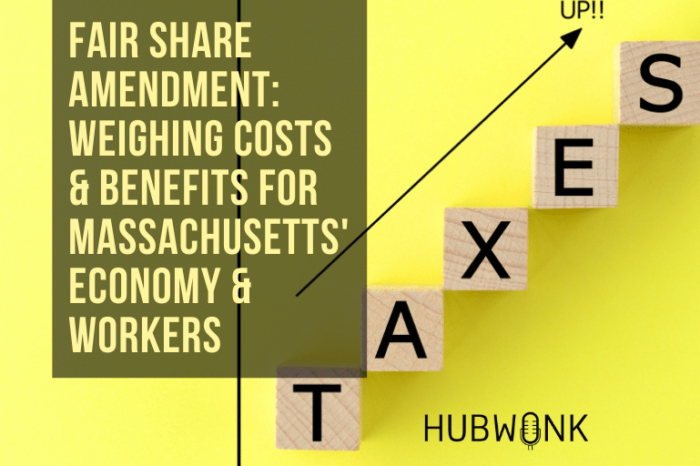Fair Share Amendment: Weighing Costs & Benefits for Massachusetts’ Economy & Workers
Hubwonk host Joe Selvaggi talks with Pioneer Institute’s Executive Director Jim Stergios about HB86, the so-called Fair Share Amendment, to tax Massachusetts household income above $1 million. They discuss its promises, its costs, and the effects of similar legislation in other states.
Learn about Pioneer Institute’s research on the economic impact of tax policy.
Guest:
 Jim Stergios is Executive Director of Pioneer Institute, a Boston-based think tank founded in 1988. Prior to joining Pioneer, Jim was Chief of Staff and Undersecretary for Policy in Massachusetts’ Executive Office of Environmental Affairs, where he drove efforts on water policy, regulatory and permit reform, and urban revitalization. His prior experience includes founding and managing a business, teaching at the university level, and serving as headmaster at a preparatory school. Jim serves on the Board of Advisors at Boston University, where he earned a doctoral degree in Political Science. Jim has been interviewed on numerous news outlets and appears regularly on local television and radio broadcasts, including WBZ, WHDH, WCVB, NECN, Boston 25, WGBH, WBUR, Nightside with Dan Rea, and WRKO. Jim’s opinion pieces have appeared in The Wall Street Journal, The Hill, The Boston Globe, and regional newspapers throughout New England.
Jim Stergios is Executive Director of Pioneer Institute, a Boston-based think tank founded in 1988. Prior to joining Pioneer, Jim was Chief of Staff and Undersecretary for Policy in Massachusetts’ Executive Office of Environmental Affairs, where he drove efforts on water policy, regulatory and permit reform, and urban revitalization. His prior experience includes founding and managing a business, teaching at the university level, and serving as headmaster at a preparatory school. Jim serves on the Board of Advisors at Boston University, where he earned a doctoral degree in Political Science. Jim has been interviewed on numerous news outlets and appears regularly on local television and radio broadcasts, including WBZ, WHDH, WCVB, NECN, Boston 25, WGBH, WBUR, Nightside with Dan Rea, and WRKO. Jim’s opinion pieces have appeared in The Wall Street Journal, The Hill, The Boston Globe, and regional newspapers throughout New England.
Get new episodes of Hubwonk in your inbox!
Related Posts















